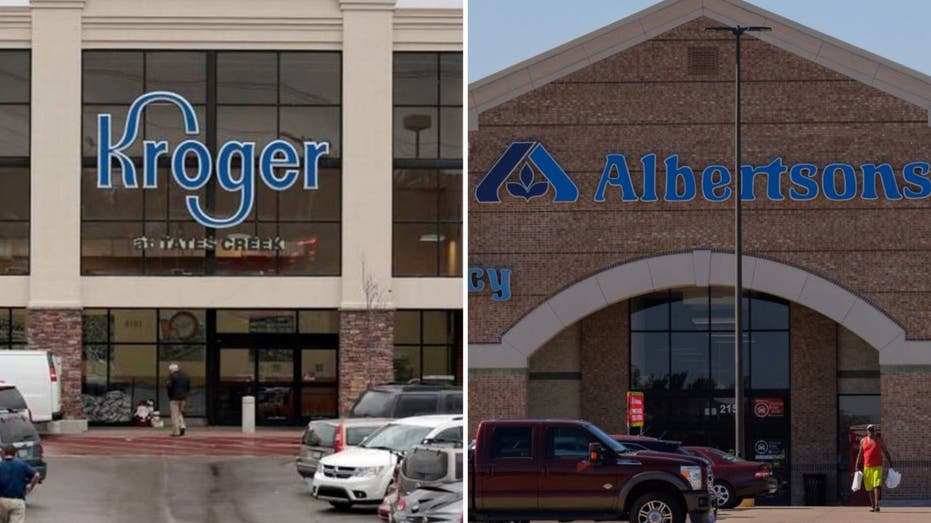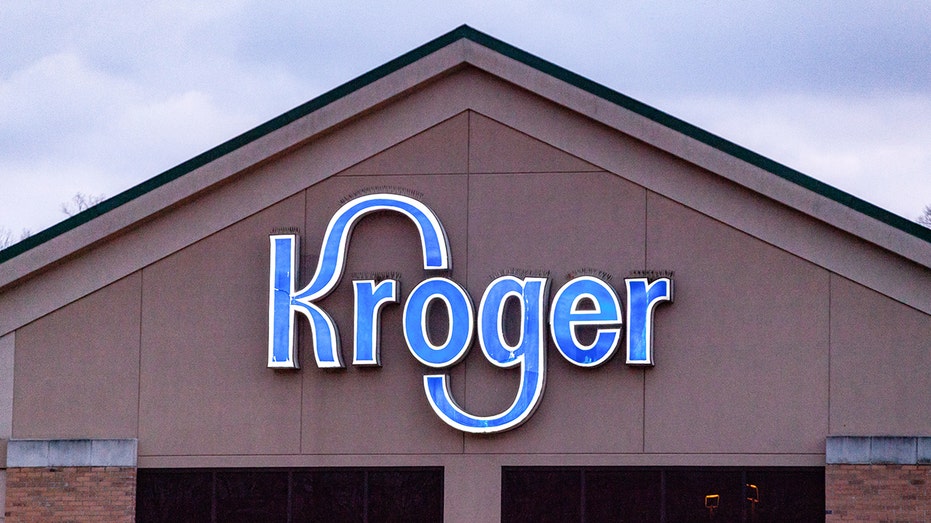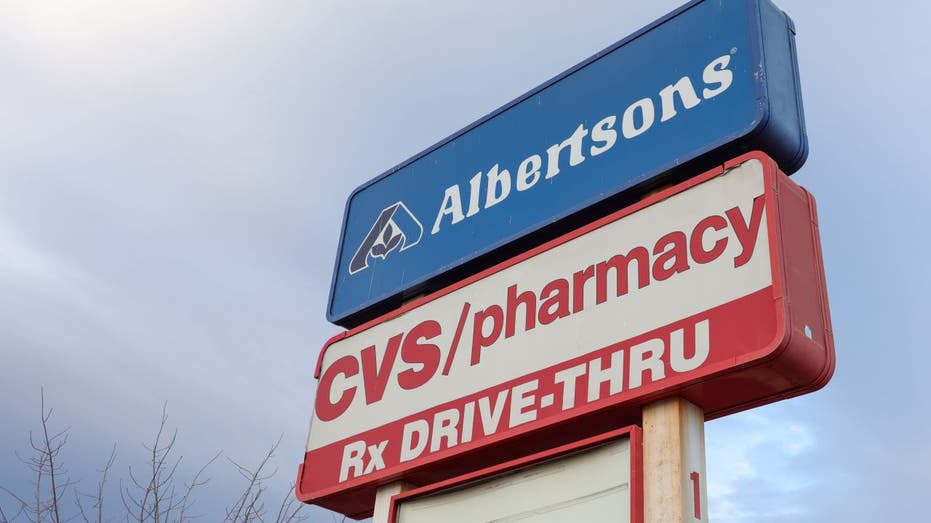Kroger-Albertsons merger: Is it good or bad for shoppers?
The FTC argues the Kroger-Albertsons merger would hurt competition and raise prices
FTC: Kroger-Albertsons merger will result in higher grocery prices
The director of the FTCs bureau of competition discusses its lawsuit to block the merger of Kroger, Albertsons on The Claman Countdown.
The lawsuit filed by the Biden administration's Federal Trade Commission (FTC) to block the proposed $24.6 billion merger between Kroger and Albertsons has kick-started a debate over whether the tie-up would undermine competition, as the agency contends, or if it would be beneficial for consumers.
The deal would see Kroger acquire Albertsons and its subsidiaries to position the supermarkets to better compete with big-box retailers like Walmart and Costco. Kroger has said that no stores would close due to the merger, with it planning to invest about $1.3 billion to update Albertsons stores, and the two companies would sell 413 stores and eight distributions to C&S Wholesale Grocers in areas where there is overlap between their operations. The two companies currently operate about 5,000 grocery stores.
Henry Liu, director of the FTC's Bureau of Competition, appeared on FOX Business Network's "The Claman Countdown" on Tuesday to discuss the lawsuit and said it's "the single largest supermarket merger in U.S. history" and said the merger would "result in higher grocery prices for everyday goods like eggs, bread and milk, and worse wages and benefits for the hundreds of thousands of employees that these two companies employ today."
"In many hundreds of local communities across the country, Kroger and Albertsons are the top two providers of groceries for those communities," Liu explained. "Our complaint alleges these two companies are each other's top competitors, number one competitor."
KROGER-ALBERTSONS MERGER IN JEOPARDY

The Federal Trade Commission on Monday filed a lawsuit to block the Kroger-Albertsons merger. (Kroger: Charles Bertram/Lexington Herald-Leader/Tribune News Service via Getty Images | Albertsons: Shelby Tauber/Bloomberg via Getty Images / Getty Images)
"They aggressively compete against each other for promotions, discounts, better services, quality of goods. And that's exactly the type of competition between two competitors that the antitrust laws were intended to preserve," he added.
An Albertsons spokesperson told FOX Business that "merging with Kroger will expand competition, lower prices, increase associate wages, protect union jobs, and enhance customers' shopping experience" and that the FTC is relying on an outdated view of the grocery industry in its lawsuit to block the merger.
"If the Federal Trade Commission is successful in blocking this merger, it would be hurting customers and helping strengthen larger, multi-channel retailers such as Amazon, Walmart and Costco – the very companies the FTC claims to be reining in – by allowing them to continue increasing their growing dominance of the grocery industry," Albertsons' statement continued. "In contrast, Albertsons Cos.' merger with Kroger will ensure our neighborhood supermarkets can better compete with these mega retailers, all while benefiting our customers, associates, and communities."
| Ticker | Security | Last | Change | Change % |
|---|---|---|---|---|
| ACI | ALBERTSONS COS INC | 17.95 | -0.14 | -0.75% |
| KR | THE KROGER CO. | 70.33 | +2.83 | +4.19% |
Kroger did not immediately respond to a request for comment.
Burt Flickinger, III, the founder of Strategic Resource Group and an expert on the retail industry, has worked with Kroger and Albertsons as well as other big name retailers, as well as the FTC and labor unions. Flickinger told FOX Business in an interview that the FTC's view of the merger is flawed and neglected to account for some of the benefits it would bring.
SOME DEMOCRATS IN CONGRESS CALL ON FTC TO BLOCK ALBERTSONS-KROGER MERGER

Kroger is looking to acquire Albertsons in a $24.6 billion deal. (Photo by Stephen Zenner/SOPA Images/LightRocket via Getty Images / Getty Images)
"I'm not sure the FTC is even reading all the information that's publicly posted. Kroger has lowered prices by $5 billion in the last 20 years, a quarter of a billion dollars every year for 20 consecutive years. Kroger is committed to lowering prices another half billion dollars in the next two years if the merger goes through," Flickinger said.
"Letting the deal go through really helps the procurement to be more total system efficient for everybody in the supermarket sector, which lowers prices for consumers," he said. Flickinger added the FTC should allow the deal to go through to help alleviate a shortage of grocery stores and pharmacies across the country.
"What the FTC failed to account for, which is timely and really important in two points, is with RiteAid going bankrupt and with CVS and Walgreens closing thousands of stores, not only are there food deserts in the U.S., but now there are pharmacy and drug store deserts across the U.S. If the FTC was fully quantifying all of retail in the U.S., it would know there's a massive vacuum of chain drug and a massive vacuum of food retail, and they should allow the Kroger-Albertsons merger to go through for urban retail, for near-urban retail, for suburban retail and rural retail."
KELLOGG CEO FACES CRITICISM FOR SUGGESTING CONSUMERS EAT CEREAL FOR DINNER

Albertsons argues that its merger with Kroger will promote competition, lower prices, boost workers' wages and support union jobs. (Photo by Ethan Miller/Getty Images / Getty Images)
He also took issue with the FTC's characterization of C&S as operating "just 23 supermarkets and a single retail pharmacy." The agency added that the divestiture plan is inadequate because the proposal is a "hodgepodge of unconnected stores, banners, brands, and other assets that Kroger's antitrust lawyers have cobbled together and falls far short of mitigating the lost competition between Kroger and Albertsons."
Flickinger said the FTC's description "didn't completely portray C&S' commercial capabilities" and added that it's a "real retail minimization." He noted that C&S has acquired grocery store brands like Piggly Wiggly, which is franchised to store operators, as well as the Grand Union supermarkets and other brands in addition to selling goods to major stores like Safeway and Target.
GET FOX BUSINESS ON THE GO BY CLICKING HERE
"C&S has a proven track record of successfully running chain retail which the FTC neglected to report and C&S is operating a network of far more stores than the FTC reported," he added.




















